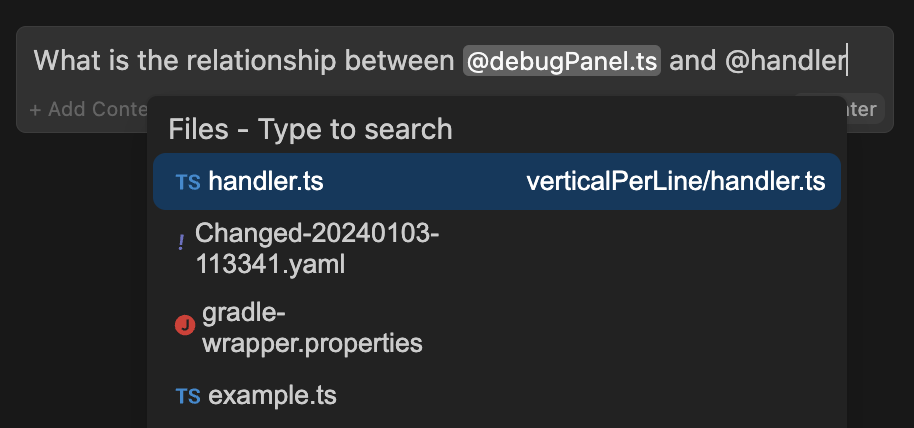Context Providers
Context Providers allow you to type '@' and see a dropdown of content that can all be provided to the model as context.
Context Providers allow you to type '@' and see a dropdown of content that can all be provided to the model as context.

Built-in Context Providers
You can add any built-in context-providers in your config file as shown below:
@File
Reference any file in your current workspace.
context:
- provider: file
@Code
Reference specific functions or classes from throughout your project.
context:
- provider: code
@Git Diff
Reference all of the changes you've made to your current branch. This is useful if you want to summarize what you've done or ask for a general review of your work before committing.
context:
- provider: diff
@Current File
Reference the currently open file.
context:
- provider: currentFile
@Terminal
Reference the last command you ran in your IDE's terminal and its output.
context:
- provider: terminal
@Open
Reference the contents of all of your open files. Set
onlyPinned to true to only reference pinned files.context:
- provider: open
params:
onlyPinned: true
@Clipboard
Reference recent clipboard items
context:
- provider: clipboard
@Tree
Reference the structure of your current workspace.
context:
- provider: tree
@Problems
Get Problems from the current file.
context:
- provider: problems
@Debugger
Reference the contents of the local variables in the debugger. Currently only available in VS Code.
context:
- provider: debugger
params:
stackDepth: 3
Uses the top n levels (defaulting to 3) of the call stack for that thread.
@Repository Map
Reference the outline of your codebase. By default, signatures are included along with file in the repo map.
includeSignatures params can be set to false to exclude signatures. This could be necessary for large codebases and/or to reduce context size significantly. Signatures will not be included if indexing is disabled.context:
- provider: repo-map
params:
includeSignatures: false # default true
Provides a list of files and the call signatures of top-level classes, functions, and methods in those files. This helps the model better understand how a particular piece of code relates to the rest of the codebase.
In the submenu that appears, you can select either
Entire codebase, or specify a subfolder to generate the repostiory map from.This context provider is inpsired by Aider's repository map.
@Operating System
Reference the architecture and platform of your current operating system.
context:
- provider: os
@HTTP
The HttpContextProvider makes a POST request to the url passed in the configuration. The server must return 200 OK with a ContextItem object or an array of ContextItems.
context:
- provider: http
params:
url: "https://api.example.com/v1/users"
headers:
- Authorization: "Bearer <token>"
The receiving URL should expect to receive the following parameters:
POST parameters
{ query: string, fullInput: string}
The response 200 OK should be a JSON object with the following structure:
Response
[ { "name": "", "description": "", "content": "" }]// OR{ "name": "", "description": "", "content": ""}
Model Context Protocol
The Model Context Protocol is a standard proposed by Anthropic to unify prompts, context, and tool use. Continue supports any MCP server with the MCP context provider. Read their quickstart to learn how to set up a local server and then set up your configuration like this:
mcpServers:
- name: My MCP Server
command: uvx
args:
- mcp-server-sqlite
- --db-path
- /Users/NAME/test.db
You'll then be able to type "@" and see "MCP" in the context providers dropdown.
Deprecated Context Providers
To provide context beyond the built-in context providers, we now recommend
using MCP Servers
View the deprecated context providers for documentation on:
@Codebase- Use the codebase awareness guide instead@Folder- Use the codebase awareness guide instead@Docs- Use the documentation awareness guide instead@Greptile- Query Greptile index@Commits- Reference git commits@Discord- Reference Discord messages@Jira- Reference Jira issues@Gitlab Merge Request- Reference GitLab MRs@Google- Google search results@Database- Database schemas@Issue- GitHub issues@Url- URL content@Search- Codebase search@Web- Web search results